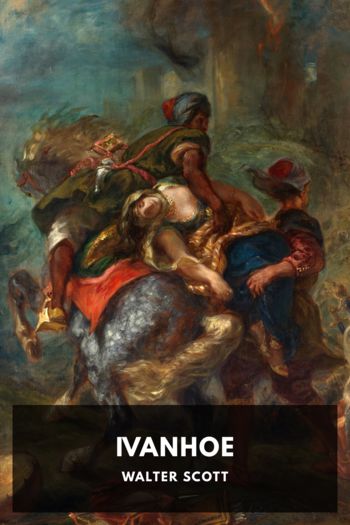Ivanhoe - Walter Scott (bookreader txt) 📗

- Author: Walter Scott
Book online «Ivanhoe - Walter Scott (bookreader txt) 📗». Author Walter Scott
I must therefore remind you, that when we first talked over together that class of productions, in one of which the private and family affairs of your learned northern friend, Mr. Oldbuck of Monkbarns, were so unjustifiably exposed to the public, some discussion occurred between us concerning the cause of the popularity these works have attained in this idle age, which, whatever other merit they possess, must be admitted to be hastily written, and in violation of every rule assigned to the epopeia. It seemed then to be your opinion, that the charm lay entirely in the art with which the unknown author had availed himself, like a second M’Pherson, of the antiquarian stores which lay scattered around him, supplying his own indolence or poverty of invention, by the incidents which had actually taken place in his country at no distant period, by introducing real characters, and scarcely suppressing real names. It was not above sixty or seventy years, you observed, since the whole north of Scotland was under a state of government nearly as simple and as patriarchal as those of our good allies the Mohawks and Iroquois. Admitting that the author cannot himself be supposed to have witnessed those times, he must have lived, you observed, among persons who had acted and suffered in them; and even within these thirty years, such an infinite change has taken place in the manners of Scotland, that men look back upon the habits of society proper to their immediate ancestors, as we do on those of the reign of Queen Anne, or even the period of the Revolution. Having thus materials of every kind lying strewed around him, there was little, you observed, to embarrass the author, but the difficulty of choice. It was no wonder, therefore, that, having begun to work a mine so plentiful, he should have derived from his works fully more credit and profit than the facility of his labours merited.
Admitting (as I could not deny) the general truth of these conclusions, I cannot but think it strange that no attempt has been made to excite an interest for the traditions and manners of Old England, similiar to that which has been obtained in behalf of those of our poorer and less celebrated neighbours. The Kendal green, though its date is more ancient, ought surely to be as dear to our feelings, as the variegated tartans of the north. The name of Robin Hood, if duly conjured with, should raise a spirit as soon as that of Rob Roy; and the patriots of England deserve no less their renown in our modern circles, than the Bruces and Wallaces of Caledonia. If the scenery of the south be less romantic and sublime than that of the northern mountains, it must be allowed to possess in the same proportion superior softness and beauty; and upon the whole, we feel ourselves entitled to exclaim with the patriotic Syrian—“Are not Pharphar and Abana, rivers of Damascus, better than all the rivers of Israel?”
Your objections to such an attempt, my dear Doctor, were, you may remember, twofold. You insisted upon the advantages which the Scotsman possessed, from the very recent existence of that state of society in which his scene was to be laid. Many now alive, you remarked, well remembered persons who had not only seen the celebrated Roy M’Gregor, but had feasted, and even fought with him. All those minute circumstances belonging to private life and domestic character, all that gives verisimilitude to a narrative, and individuality to the persons introduced, is still known and remembered in Scotland; whereas in England, civilisation has been so long complete, that our ideas of our ancestors are only to be gleaned from musty records and chronicles, the authors of which seem perversely to have conspired to suppress in their narratives all interesting details, in order to find room for flowers of monkish eloquence, or trite reflections upon morals. To match an English and a Scottish author in the rival task of embodying and reviving the traditions of their respective countries, would be, you alleged, in the highest degree unequal and unjust. The Scottish magician, you said, was, like Lucan’s witch, at liberty to walk over the recent field of battle, and to select for the subject of resuscitation by his sorceries, a body whose limbs had recently quivered with existence, and whose throat had but just uttered the last note of agony. Such a subject even the powerful Erictho was compelled to select, as alone capable of being reanimated even by her potent magic—
—gelidas leto scrutata





Comments (0)